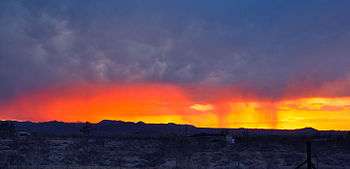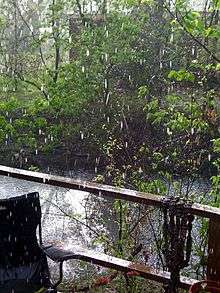Sunshower
A sunshower or sun shower is a meteorological phenomenon in which rain falls while the sun is shining.[1] A sunshower is usually the result of accompanying winds associated with a rain storm sometimes miles away, blowing the airborne raindrops into an area where there are no clouds, therefore causing a sunshower. Sometimes a sunshower is created when a single rain shower cloud passes overhead, and the Sun's angle keeps the sunlight from being obstructed by overhead clouds.


Sunshower conditions often lead to the appearance of a rainbow, if the sun is at a sufficiently low angle.[1] Although used in the United States, Canada, Australia, New Zealand, Ireland and the UK, the term "sunshower" is rarely found in dictionaries.[2] Additionally, the phenomenon has a wide range of sometimes remarkably similar folkloric names in cultures around the world.[3] A common theme is that of clever animals and tricksters getting married or related to the devil, although many variations of this theme are in existence.[2][3]
Folkloric names
- In Afrikaans, this phenomenon, i.e. when it rains and the sun shines, the traditional belief is Jakkals trou met wolf se vrou, meaning 'Jackal marries wolf's wife'.
- In Nigeria, when it rains and the sun is shining at the same time, people say that a Lion is/has giving/given birth.
- In Albania, when it rains and the sun shines, people say that a romani wedding is taking place somewhere near.
- In Morocco, Algeria and Tunisia, it is called "عرس الذيب – عرس الذئب (Ar's A'Dib)" or "the wolf's wedding"
- in Argentina, it is called El mono del casamiento de Mirtha Legrand (The monkey at the wedding of Mirtha Legrand).
- In Bangladesh and West Bengal, India: "খ্যাকশিয়ালের বিয়ে" "Khêkshialer biye" "Jackal's(or fox's) wedding"
- In Basque: "Azeri besta" ("Fox feast") or "Azeri ezteia" ("Fox's wedding"): as the sun is shining, the chickens stay outside, but as it is also raining, they remain still, paralyzed by the rain; the fox seizes that occasion to eat them.
- In Belgium, Flanders: the traditional belief is that of "Duiveltjeskermis" or "Devil's fair"
- In Brazil, "Casamento da raposa" (fox's wedding), "Sol e chuva, casamento de viúva", which is a rhyme that means "Sun and rain, widow's wedding/marriage" or "Chuva e sol, casamento do espanhol", which is a rhyme that means "Rain and Sun, Spanish man's wedding/marriage" (which is often used as a response to the first rhyme or vice versa).
- In Bulgaria, there is a saying about a bear getting married.[2]
- In El Salvador, it is said that the deer is giving birth.
- In Ethiopia and Eritrea, it is said that the hyena is giving birth.
- In Finland, it is called "Ketut kylpevät" or "foxes are taking bath"
- In France, it is traditionally believed that "Le mariage du loup" or "the wolf's wedding", or "giboulée" is taking place
- In Galician, the traditional belief is that the vixen or the fox are getting married: casa a raposa / casa o raposo; sometimes the wolf and the vixen: Estanse casando o lobo coa raposa.[4]
- A wide range of expressions are attested in the German-speaking countries, many of them historically, e.g. "There's a feast day in hell" (Oldenburg), "marriage [in hell]" (East Frisia), "funfair [in hell]" (Westphalia, Rhineland), the latter one attested already in 1630. Others are "They're baking in hell", "The devil is making pancakes" (Oldenburg), "Frau Holle hosts a funfair" (Lower Rhineland), "There's a marriage among the heathens/gypsies" (Switzerland), "The devil's dancing with his grandmother" (Winsen district, Lower Saxony), "The devil is marrying" (Schleswig-Holstein), "The devil is endowing his daughters" (Mecklenburg). Often, the phenomenon is interpreted as a struggle between rain and sunshine. "The devil is beating his wife/grandmother/mother-in-law" (Bavaria, Austria, Lunenburg), "The deviless gets beaten" (Eger country, Bohemia), "The devil is stabbing his wife with a sword" (Celle, Lower Saxony), "The devil has hanged his mother" (Moselle). The versions referring to the devil's wife (instead of grandmother etc) are the older ones. Praetorius (Blockes Berges Verrichtung, Leipzig 1668) mentions „Der Teufel schlägt seine Mutter, daß sie öl gibt“ (The devil is beating his wife so she will serve ale). In Schleswig-Holstein and Oldenburg, there's also: "The devil is bleaching his grandmother", as this usually involved repeated dampening of cloth in the sun – quite fitting for the weather phenomenon. Otherwise, idioms refer to witches. "The witches are dancing", "The old witch is making pancakes" (Schleswig-Holstein), "The witches are making butter" (Silesia), "The witches are being buried at the end of the world" (North Frisia). Although later on witches are often depicted as the devil's mistresses, not a single idiom about sunshowers shows them as such. Around the Baltic Sea, there are also references to sunshowers and "whore's children", i.e. illegitimate children: "Now a whore's child has been sired/baptised" (Mecklenburg). Similar expressions could be found in Finland. Furthermore there are humorous versions like: "A lieutenant is paying his debts" (Rhineland), "A nobleman goes to heaven" (Lunenburg), "A tailor goes to heaven" (Schleswig-Holstein, Upper Saxony), "The devil gets a lawyer's soul" (Oldenburg). Completely different in origin are "The wolf has fever/bellyache" or "Now the wolves are pissing" (Mecklenburg).[5]
- in Greece they say "ήλιος και βροχή, παντρεύονται οι φτωχοί. Ήλιος και φεγγάρι, παντρεύονται οι γάιδαροι," which means "Sun and rain, the poor are marrying. Sun and moon, the donkeys are marrying."
- In Hawaii, it is known as "ghost rain" or "liquid sunshine".
- In Hungary, it is known as "veri az ördög a feleségét" which translates to "the devil is beating his wife".
- In Bihar, India, rain during sunshine is called a "siyaar ke biyaah" ("jackals' wedding") and children may then sing about it.
- In Iran it is known as ".گرگ داره میزاد" which means "wolf giving birth".
- In Italy they say "Piove e c'è il sole, la gatta fa l'amore" which means "It rains with the sun, the (female) cat is making love".
- In Jamaica, it is known as "The Devil and his wife are having a fight" This is significant of the two opposing elements: Sun Vs. Rain.
- In Japan, it is known as "Kitsune no yomeiri", or "the fox's wedding."
- In Kenya, hyenas or monkeys are marrying.
- In Korea, one common term is "fox rain" (여우비), referring to a legend about a tiger marrying a fox, causing a cloud, who loved the fox, to weep behind the sun. For this reason, the day of a sunshower is also called 호랑이 장가가는 날 "tiger's wedding day".
- In the Mazandarani language, in north of Iran, it is also called "the jackal's wedding".
- In Maldives, it is also "The rain that falls when a noble infidel dies".
- In Malta it is known as "Twieled Tork" which translates to "A Turkish baby has been born".
- In Tunisia and Morocco, it is the "wolf's wedding". In the north, they say: "Shta Wel Kayla Wel 'Urss Del 'Ayla" which means "The rain and the sun and the girl's wedding."
- In Nepal (Nepali), it is called "a jackal's wedding" or "Gham-paani, gham-paani shyal ko bihe" which literally translates to "Sunshower, sunshower, a jackal's wedding". There are folksongs about sunshowers.
- In Pashto, it is also called "Da gidarh wade" or "the jackal's wedding".
- In Pakistani Punjab, it is also called "Kani gidh Da waye" or "one eye jackal's wedding".
- In Paraguay, it is said that "El Diablo se está casando" or "The Devil's getting married".
- In Philippines, the it is said the tikbalang is marrying.[6]
- In Puerto Rico and the Dominican Republic, it is said that witches are marrying.
- In Sri Lanka in the Sinhala, it is called "the fox's wedding" (අව්වයි වැස්සයි, නරියගෙ මගුලයි).
- In South African English, a sunshower is referred to as a "monkey's wedding", a loan translation of the Zulu umshado wezinkawu, a wedding for monkeys.[2]
- In Sudan, the donkey and monkey are getting married.
- In various African languages, leopards are getting married.
- In Sweden it is called "vitterväder".
- In Trinidad and Tobago, it is called "Monkey Marriddin" or monkeys marrying.
- In parts of the United Kingdom, traditional belief is that it is "a monkey's birthday".
- In Tanzania, they say "Simba anazaa" – literally "the lioness is giving birth".
- In Thailand, it is said to happen when somebody passes away.
- In Ukraine, it is called "грибний дощ (hrybnyj doshch)" or "the mushroom rain".
- In Zimbabwe, it is referred to as a "monkey's wedding".
India
- In Assamese, it is called "Khonra xiyaalor biya (খঁৰা শিয়ালৰ বিয়া)", meaning "the bob-tailed fox's wedding".
- In Bengali, it is called "the blind fox's wedding".
- In Gujarati, it is called "Naago varsaad", meaning "naked rain".
- In Hindi, it is also called "the ghosts' wedding".[2]
- In Rajasthan people say "Bhoot Bhootni Ra byaa" meaning "the wedding of 2 ghosts"
- In Kannada, it is called "Kaage Nari maduve" which means "Crow and fox marrying" (ಕಾಗೆ ನರಿ ಮದುವೆ)
- In Konkani, it is called "a monkey's wedding".
- In Marathi, it is called "nagda paaus", meaning "naked rain".
- In Malayalam, it is called "the fox's wedding" (കുറുക്കന്റെ കല്യാണം)
- In Oriya, it is called "the fox's wedding" (ଖରା ହେଉଛି ମେଘ ହେଉଛି, ଶିଆଳ ପୁଅ ବାହା ହେଉଛି).
- In Tamil, it is called "The fox and the crow are marrying" (காக்காவுக்கும் நரிக்கும் கல்யாணம்).
- In Telugu, it is called "Yenda Vanalo, kukkala nakkala pelli" which means "Dogs and foxes marrying in the sunshowers" (ఎండా వానలో కుక్కల, నక్కల పెళ్ళి). It can also be called "Kaki Pelli", which means "crow's marriage".
- In India, and Burma, those who speak the Tangkhul language, refer to sunshowers as the 'wedding of a spirit to a human'.
Folklore
In the Southern United States, a sunshower is traditionally believed to be when "the devil is beating his wife." A regional belief from Tennessee is "the devil is kissing his wife".[7]
Other variations
- Estonian (vaeslapse pisarad), the phenomenon is described as "orphans' tears", where the sun is the grandmother drying those tears.
- In Russian and Lithuanian, it is called грибной дождь (gribnoy dozhd'), "mushroom rain", as such conditions are traditionally believed to be favorable to growing mushrooms.[8] Also, it is called слепой дождь (slepoy dozhd'), "blind rain", because it doesn't see that it shouldn't be raining.[9]
- In Indonesian, the phenomenon is the sign of someone who is rich and well known has died in the place where the sunshower happened, so the sky is showing its condolences.
- In Catalonia it is said that the witches are combing their hair: "Les bruixes es pentinen".
- In Poland it is said that a witch is making butter, "Słońce świeci, deszczyk pada, baba jaga masło składa".
- In the Caribbean islands such as Puerto Rico and The Dominican Republic, it is said that a witch is marrying.
- In Guyana, it is known as "Sun-Rain".
- In Trinidad and Tobago, "Sun shining, Rain falling, Monkey marrying"
- In Haiti, it is said that a zombie is beating his wife for salty food. Devil is sometimes interchanged for zombie.
- In Jamaica, "the devil and his wife are fighting for a piece of hambone."
- In Argentina and Uruguay, it is said that an old woman is getting married: "Llueve con sol, se casa una vieja".
- In Serbia, It is said traditionally believed that angels are bathing, "Анђели се купају" (Anđeli se kupaju).
- In Croatia, it is said that gypsies are marrying, "Cigani se žene".
- In Kazakhstan, it is said that a poor man got rich, "Кедей адам байыды".
- In Macedonia, it is also said that gypsies are marrying, "Циганка се мажи", and also that a bear is getting married: "Мечка се жени/мажи".
- In Venezuela, the word 'cachimba' refers to raining while sunny.
- In Cuba, "Se está casando la hija del diablo", i.e. "The Devil's daughter is getting married"
- In Hebrew it is called a שמש משקרת (Shémesh meshakéret) – a lying sun
- In Vietnamese, it is called "mua bong may" or "mưa bóng mây" (cloud shadow rain)
- In Efik culture of south eastern flank of Nigeria, it is believed that the lioness (or any of the wild cats) is giving birth behind the house.
- in Rwanda they say "impyisi yarongoye" which means fox get married
- in Australia it means a keemu (kangaroo + emu hybrid) was born with itchy nuts.
In popular culture
- American rapper Eminem's 2009 song titled "Music Box" includes the lyrics: "There's thunder, I wonder how come it rains but the sun is out/The devil's upset with his wife, they must be sluggin' it out."
- American soul singer Thelma Houston titled her 1969 debut album Sunshower.
- Half-brothers Stony Browder and Thomas "August Darnell" Browder co-authored a song called "Sunshower", which was included on Dr. Buzzard's Original Savannah Band's 1976 eponymous debut album.
- Akira Kurosawa's 1990 film Dreams has a segment about a young boy witnessing a fox wedding (Kitsune no yomeiri) procession during a sunshower.
- RZA of the Wu-Tang Clan has a song called "Sunshower" off their 1997 international release of Wu-Tang Forever.
- Chris Cornell's 1999 album Euphoria Morning has a bonus track titled "Sunshower".
- English-Sri Lankan musician M.I.A. recorded a single "Sunshowers" in 2004. The song appears on her 2005 debut album Arular.
- American arena rock band Journey recorded a song, "Like a Sunshower", on their 2008 album Revelation.
- In the Creedence Clearwater Revival song "Have You Ever Seen The Rain?", the chorus is "I want to know, have you ever seen the rain/Comin’ down on a sunny day?"
- American musician David Bazan's EP Fewer Moving Parts contained the song "Cold Beer & Cigarettes", the alternate title of which is "The Devil is Beating His Wife"
See also
References
- Symonds, Steve (2004). "Weather Terms - Wild Weather". ABC North Coast. Retrieved 17 November 2006.
- Quinion, Michael (2001). "Monkey's Wedding". World Wide Words. Retrieved 17 November 2006.
- Vaux, Bert (1998). "Sunshower summary". linguistlist.org. Retrieved 17 November 2006.
- Ferro Ruibal, Xesús (2007). "Cando chove e dá o sol... ¿Un fraseoloxismo internacional poliédrico?" (PDF). Cadernos de Fraseoloxía Galega (in Galician). Centro Ramón Piñeiro para a Investigación en Humanidades (9): 67–94.
- "Kirmes". Redewendungen : Wörterbuch der deutschen Idiomatik (in German) (4th ed.). Berlin, Mannheim, Zürich: Duden. 2013. ISBN 9783411023929.
- "Rare sunshower phenomenon". CNN iReport. Retrieved 23 October 2017.
- "Sunshowers: When The Devil Beats His Wife". Appalachian Magazine. 2018. Retrieved 13 June 2019.
- "A year of words". Waywordradio.org.
- "Слепой дождь". dic.academic.ru (in Russian).
Bibliography
- Blust, Robert (1998) The Fox's Wedding. Manuscript, University of Hawaii.
- Evgen'jeva, A. P., ed. (1985-) Slovar' russkogo jazyka v 4 tomakh, 3rd edition. Moscow.
- Kuusi, Matti (1957) Regen bei Sonnenschein: Zur Weltgeschichte einer Redensart. "Folklore Fellows Communications" n. 171, Helsinki 1957 (it appeared translated into Italian in the journal "Quaderni di Semantica" 13 (1992) and 14 (1993)).
- Hoffmann-Krayer, E. (1930–31) Handwörterbuch des deutschen Aberglaubens. Berlin and Leipzig: Walter de Gruyter.
External links
| Wikimedia Commons has media related to Sun shower. |
